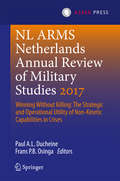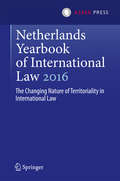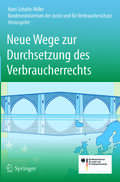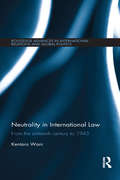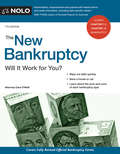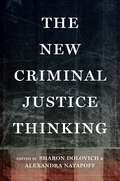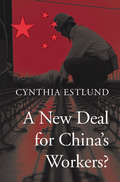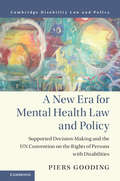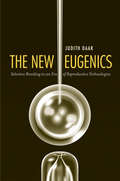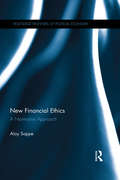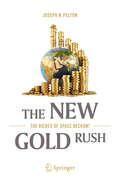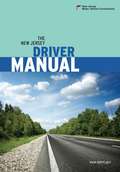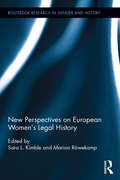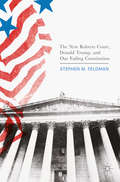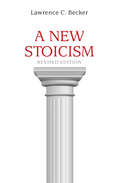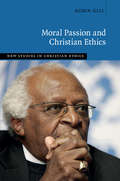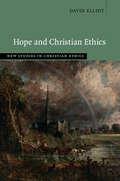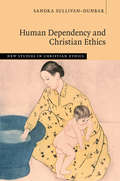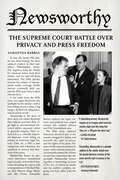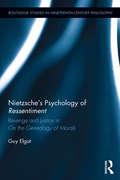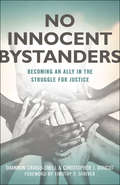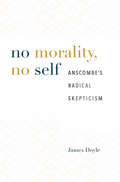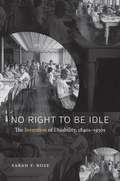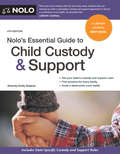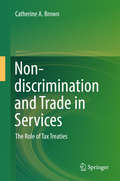- Table View
- List View
Netherlands Annual Review of Military Studies 2017
by Paul A.L. Ducheine Frans P.B. OsingaInternational conflict resolution increasingly involves the use of non-military power and non-kinetic capabilities alongside military capabilities in the face of hybrid threats. In this book, counter-measures to those threats are addressed by academics with both practical and theoretical experience and knowledge, providing strategic and operational insights into non-kinetic conflict resolution and on the use of power to influence, affect, deter or coerce states and non-state actors. This volume in the NL ARMS series deals with the non-kinetic capabilities to address international crises and conflicts and as always views matters from a global perspective. Included are chapters on the promise, practice and challenges of non-kinetic instruments of power, the instrumentality of soft power, information as a power instrument and manoeuvring in the information environment, Russia's use of deception and misinformation in conflict, applying counter-marketing techniques to fight ISIL, using statistics to profile terrorists, and employing tools such as Actor and Audience Analysis. Such diverse subjects as lawfare, the Law of Armed Conflict rules for non-kinetic cyber attacks, navigation warfare, GPS-spoofing, maritime interception operations, and finally, as a prerequisite, innovative ways for intelligence collection in UN Peacekeeping in Mali come up for discussion. The book will provide both professionals such as (foreign) policy makers and those active in the military services, academics at a master level and those with an interest in military law and the law of armed conflict with useful and up-to-date insights into the wide range of subjects that are contained within it. Paul A.L. Ducheine and Frans P.B. Osinga are General Officers and full professors at the Faculty of Military Sciences of the Netherlands Defence Academy in Breda, The Netherlands.
Netherlands Yearbook of International Law 2016
by Martin Kuijer Wouter WernerThe Netherlands Yearbook of International Law was first published in 1970. It offers a forum for the publication of scholarly articles of a conceptual nature in a varying thematic area of public international law. International law holds a paradoxical position with territory. Most rules of international law are traditionally based on the notion of State territory, and territoriality still significantly shapes our contemporary legal system. At the same time, new developments have challenged territory as the main organising principle in international relations. Three trends in particular have affected the role of territoriality in international law: the move towards functional regimes, the rise of cosmopolitan projects claiming to transgress state boundaries, and the development of technologies resulting in the need to address intangible, non-territorial, phenomena. Yet, notwithstanding some profound changes, it remains impossible to think of internation al law without a territorial locus. If international law is undergoing changes, this implies a reconfiguration of territory, but not a move beyond it.
Neue Wege zur Durchsetzung des Verbraucherrechts
by Hans Schulte-Nölke Bundesministerium Der JustizDer Band beschäftigt sich mit der Durchsetzung von Verbraucherrechten und durchleuchtet kritisch das bisherige System in Deutschland aus ökonomischer, rechtsvergleichender und verwaltungswissenschaftlicher Perspektive. Derzeit müssen Verbraucher oder Verbände in Deutschland Verbraucherrechte zumeist selbst aktiv auf dem Zivilrechtsweg bei Gericht durchsetzen. Behördliche Zuständigkeiten bestehen in nur wenigen Bereichen wie zum Beispiel im Energie- und Telekommunikationsrecht sowie bei Finanzdienstleistungen.Anlässlich der Verbraucherrechtstage 2016 hat das Bundesministerium der Justiz und für Verbraucherschutz zusammen mit renommierten und sachkundigen Gästen ausgelotet, ob und in welchen Fällen es sinnvoll sein kann, neue, ergänzende Kompetenzen für Behörden zu schaffen, damit kollektive Verbraucherrechte besser als bisher durchgesetzt werden können. Ein vergleichender Blick fiel dabei auch auf entsprechende Instrumente in ausgewählten EU-Mitgliedstaaten (Niederlande, Großbritannien) und den USA. Die diskutierten Themen sind Inhalt dieses Bandes.
Neutrality in International Law: From the Sixteenth Century to 1945 (Routledge Advances in International Relations and Global Politics)
by Kentaro WaniNeutrality is a legal relationship between a belligerent State and a State not participating in a war, namely a neutral State. The law of neutrality is a body of rules and principles that regulates the legal relations of neutrality. The law of neutrality obliges neutral States to treat all belligerent States impartially and to abstain from providing military and other assistance to belligerents. The law of neutrality is a branch of international law that developed in the nineteenth century, when international law allowed unlimited freedom of sovereign States to resort to war. Thus, there has been much debate as to whether such a branch of law remains valid in modern international law, which generally prohibits war and the use of force by States. While there has been much debate regarding the current status of neutrality in modern international law, there is a general agreement among scholars as to the basic features of the traditional law of neutrality. Wani challenges the conventional understanding of the traditional neutrality by re-examining the historical development of the law of neutrality from the sixteenth century to 1945. The modification of the conventional understanding will provide a fundamentally new framework for discussing the current status of neutrality in modern international law.
New Bankruptcy, The: Will It Work for You?
by Stephen Elias Leon BayerChoose the best bankruptcy option The New Bankruptcy provides clear-cut information, answers to common questions, worksheets, and strategies to help you figure out whether bankruptcy is the right solution to your debt problem. Find out: the main differences between Chapter 7 and Chapter 13 bankruptcy whether you qualify for Chapter 7 bankruptcy (the means test) how the Chapter 13 repayment plan works which type of bankruptcy (7 or 13) is better in various situations which debts are wiped out what happens to your property, including your home, car, and retirement accounts, and other ways to handle debt problems. The book also outlines the bankruptcy process and includes completed sample bankruptcy forms.
The New Criminal Justice Thinking
by Alexandra Natapoff Sharon DolovichA vital collection for reforming criminal justice.After five decades of punitive expansion, the entire U.S. criminal justice system— mass incarceration, the War on Drugs, police practices, the treatment of juveniles and the mentally ill, glaring racial disparity, the death penalty and more — faces challenging questions. What exactly is criminal justice? How much of it is a system of law and how much is a collection of situational social practices? What roles do the Constitution and the Supreme Court play? How do race and gender shape outcomes? How does change happen, and what changes or adaptations should be pursued? The New Criminal Justice Thinking addresses the challenges of this historic moment by asking essential theoretical and practical questions about how the criminal system operates. In this thorough and thoughtful volume, scholars from across the disciplines of legal theory, sociology, criminology, Critical Race Theory, and organizational theory offer crucial insights into how the criminal system works in both theory and practice. By engaging both classic issues and new understandings, this volume offers a comprehensive framework for thinking about the modern justice system. For those interested in criminal law and justice, The New Criminal Justice Thinking offers a profound discussion of the complexities of our deeply flawed criminal justice system, complexities that neither legal theory nor social science can answer alone.
A New Deal for China’s Workers?
by Cynthia EstlundChina’s leaders aspire to the prosperity, political legitimacy, and stability that flowed from America’s New Deal, but they are irrevocably opposed to the independent trade unions and mass mobilization that brought it about. Cynthia Estlund’s crisp comparative analysis makes China’s labor unrest and reform legible to Western readers.
A New Era for Mental Health Law and Policy: Supported Decision-Making and the UN Convention on the Rights of Persons with Disabilities (Cambridge Disability Law and Policy Series)
by Piers GoodingThe Convention on the Rights of Persons with Disabilities (CRPD) has generated new ideas and standards in healthcare and disability law and policy. In the mental health context, the CRPD directs governments to ensure people with mental impairments are treated equally before the law, including ensuring people have access to the resources necessary to enjoy their rights. But what this means in practice remains unclear. In addition, current domestic laws that authorise involuntary psychiatric interventions stand at cross-purposes with the CRPD, which requires respect for the 'will, preference and rights' of persons with disabilities 'on an equal basis with others'. This book explores the implications of the CRPD for law, policy and practice that responds to the complex issues raised by mental health impairment and disability. It argues that the support framework of the CRPD holds potential to address persistent shortcomings in mental health law and policy. Proposes a new approach to mental health and the law Promotes the application of international human rights law to mental health law, policy and practice Considers new solutions to longstanding problems regarding coercive mental health treatment
The New Eugenics: Selective Breeding in an Era of Reproductive Technologies
by Prof. Judith DaarA provocative examination of how unequal access to reproductive technology replays the sins of the eugenics movement Eugenics, the effort to improve the human species by inhibiting reproduction of "inferior" genetic strains, ultimately came to be regarded as the great shame of the Progressive movement. Judith Daar, a prominent expert on the intersection of law and medicine, argues that current attitudes toward the potential users of modern assisted reproductive technologies threaten to replicate eugenics' same discriminatory practices. In this book, Daar asserts how barriers that block certain people's access to reproductive technologies are often founded on biases rooted in notions of class, race, and marital status. As a result, poor, minority, unmarried, disabled, and LGBT individuals are denied technologies available to well-off nonminority heterosexual applicants. An original argument on a highly emotional and important issue, this work offers a surprising departure from more familiar arguments on the issue as it warns physicians, government agencies, and the general public against repeating the mistakes of the past.
New Financial Ethics: A Normative Approach (Routledge Frontiers of Political Economy)
by Aloy SoppeFollowing the internationalisation, globalisation and deregulation of the financial market over the last few decades, the financial sector has evolved from a servicing industry into an initiating and leading sector in the international industrialised economy. The power of the financial sector, including Credit Rating Agencies, determines the creditworthiness of companies and countries. Today’s financial sector dominates instead of serving the real economy, which puts substantial pres - sure on all the agencies involved, not least the banks, to make the profits that will drive economic growth. As a result of this pressure, moral conduct in the financial sector has been put under severe strain. This book examines the experience of the recent financial crisis and argues that a firmer ethical grounding for the financial sector is required to prevent the crisis being repeated. The book offers a model for making judgements on financial markets, institutions and products. The model is built on seven major criteria which are examined in depth: Justice, Nature, Sustainability, Legality, Risk and Return, the Stakeholder model and Monism. This multidisciplinary approach integrates philosophy, economics and law to arrive at a new normative approach to financial ethics. This book is a must-read for finance students at academic levels but also for professionals in the financial sector, who can be helped by implementing the model of NFE in solving financial dilemmas.
The New Gold Rush: The Riches of Space Beckon!
by Joseph N. PeltonThis book captures the most exciting advances in the harnessing of space as a global resource. The authors track the growing number of space businesses and opportunities for investors, and the many possible benefits of spaceplanes, space stations and even space colonies. The authors also discuss the need for more regulatory reform. Companies like Planetary Resources are now forming to find mineral-rich asteroids and bring back new riches to Earth. Solar power satellites in the next few years will start to beam clean energy back to Earth, to meet the growing demands of a still-developing world. Innovative space industries are vital to the survival of modern human life, and the authors demonstrate what can be done to encourage the growing of the "New Space" frontier. From lassoing and then mining asteroids to developing new methods of defending the planet from space hazards and setting up new hotels and adventures for tourists in space, this new industry will have profound effects on Earth, especially on its economy. This book is based on a study of international experts commissioned ahead of the UNISPACE+50 meeting, having distilled the results of this comprehensive fact-finding process into a compact and very readable form. It can serve as an excellent starting point for understanding all the activities underway or planned to make space truly our next frontier.
The New Jersey Driver Manual 2017
by New Jersey Motor Vehicle CommissionThe New Jersey Driver Manual by the New Jersey Motor Vehicle Commission
New Perspectives on European Women's Legal History (Routledge Research in Gender and History #24)
by Sara L. Kimble Marion RöwekampThis book integrates women’s history and legal studies within the broader context of modern European history in the late nineteenth and twentieth centuries. Sixteen contributions from fourteen countries explore the ways in which the law contributes to the social construction of gender. They analyze questions of family law and international law and highlight the politics of gender in the legal professions in a variety of historical, social and national settings, including Eastern, Southern, Western, Northern and Central Europe. Focusing on different legal cultures, they show us the similarities and differences in the ways the law has shaped the contours of women and men’s lives in powerful ways. They also show how women have used legal knowledge to struggle for their equal rights on the national and transnational level. The chapters address the interconnectedness of the history of feminism, legislative reforms, and women’s citizenship, and build a foundation for a comparative vision of women’s legal history in modern Europe.
The New Roberts Court, Donald Trump, and Our Failing Constitution
by Stephen M. FeldmanThis book examines what Supreme Court Justice Antonin Scalia's death and Judge Neil Gorsuch's appointment means for the future of democracy in America. Before Scalia's death, the five conservative justices of the Roberts Court--John Roberts, Clarence Thomas, Samuel Alito, Anthony Kennedy, and Antonin Scalia--stamped a capitalized version of democracy, discussed in this book as Democracy, Inc. , with a constitutional imprimatur. The justices believed they were upholding the American way of life, but they instead placed our democratic-capitalist system in its gravest danger since World War II. Democracy, Inc. not only contravenes the framers' vision of a system balanced between the public and private spheres, government power and individual rights, but also threatens the very survival of American constitutionalism. With the looming confirmation of Gorsuch, the new Court must choose: will it follow the early Roberts Court in approving and bolstering Democracy, Inc. , or will it restore the crucial balance between the public and private spheres in our democratic-capitalist system?
A New Stoicism
by Lawrence C. BeckerWhat would stoic ethics be like today if stoicism had survived as a systematic approach to ethical theory, if it had coped successfully with the challenges of modern philosophy and experimental science? A New Stoicism proposes an answer to that question, offered from within the stoic tradition but without the metaphysical and psychological assumptions that modern philosophy and science have abandoned. Lawrence Becker argues that a secular version of the stoic ethical project, based on contemporary cosmology and developmental psychology, provides the basis for a sophisticated form of ethical naturalism, in which virtually all the hard doctrines of the ancient Stoics can be clearly restated and defended. Becker argues, in keeping with the ancients, that virtue is one thing, not many; that it, and not happiness, is the proper end of all activity; that it alone is good, all other things being merely rank-ordered relative to each other for the sake of the good; and that virtue is sufficient for happiness. Moreover, he rejects the popular caricature of the stoic as a grave figure, emotionally detached and capable mainly of endurance, resignation, and coping with pain. To the contrary, he holds that while stoic sages are able to endure the extremes of human suffering, they do not have to sacrifice joy to have that ability, and he seeks to turn our attention from the familiar, therapeutic part of stoic moral training to a reconsideration of its theoretical foundations.
New Studies in Christian Ethics: Moral Passion and Christian Ethics
by Robin GillIn this book, Robin Gill argues that moral passion and rational ethical deliberation are not enemies, and that moral passion often lurks behind many apparently rational ethical commitments. He also contends that though moral passion is a key component of truly selfless moral action, without rational ethical deliberation it can also be extremely dangerous. Gill maintains that a reanalysis of moral passion is overdue. He inspects the gap between the 'purely rational' accounts of ethics provided by some moral philosophers and the normative positions that they espouse and/or the moral actions that they pursue. He also contends that Christian ethicists have not been adept at identifying their own implicit moral passion or at explaining why it is that doctrinal positions generate passionately held moral conclusions. Using a range of disciplines, including cognitive science and moral psychology, alongside the more usual disciplines of moral philosophy and religious ethics, Gill also makes links with moral passion in other world faith traditions.
New Studies in Christian Ethics: Hope and Christian Ethics (New Studies in Christian Ethics)
by David ElliotThe theological virtue of hope has long been neglected in Christian ethics. However, as social, civic and global anxieties mount, the need to overcome despair has become urgent. This book proposes the theological virtue of hope as a promising source of rejuvenation. Theological hope sustains us from the sloth, presumption and despair that threaten amid injustice, tragedy and dying; it provides an ultimate meaning and transcendent purpose to our lives; and it rejoices and refreshes us 'on the way' with the prospect of eternal beatitude. Rather than degrading this life and world, hope ordains earthly goods to our eschatological end, forming us to pursue social justice with a resilience and vitality that transcend the cynicism and disillusionment so widespread at present. Drawing on Thomas Aquinas and virtue ethics, the book shows how the virtue of hope contributes to human happiness in this life and not just the next.
New Studies in Christian Ethics: Human Dependency and Christian Ethics (New Studies in Christian Ethics)
by Sullivan-Dunbar SandraDependency is a central aspect of human existence, as are dependent care relations: relations between caregivers and young children, persons with disabilities, or frail elderly persons. In this book, Sandra Sullivan-Dunbar argues that many prominent interpretations of Christian love either obscure dependency and care, or fail to adequately address injustice in the global social organization of care. Sullivan-Dunbar engages a wide-ranging interdisciplinary conversation between Christian ethics and economics, political theory, and care scholarship, drawing on the rich body of recent feminist work reintegrating dependency and care into the economic, political, and moral spheres. She identifies essential elements of a Christian ethic of love and justice for dependent care relations in a globalized care economy. She also suggests resources for such an ethic ranging from Catholic social thought, feminist political ethics of care, disability and vulnerability studies, and Christian theological accounts of the divine-human relation.
Newsworthy: The Supreme Court Battle over Privacy and Press Freedom
by Samantha BarbasIn 1952, the Hill family was held hostage by escaped convicts in their suburban Pennsylvania home. The family of seven was trapped for nineteen hours by three fugitives who treated them politely, took their clothes and car, and left them unharmed. The Hills quickly became the subject of international media coverage. Public interest eventually died out, and the Hills went back to their ordinary, obscure lives. Until, a few years later, the Hills were once again unwillingly thrust into the spotlight by the media—with a best-selling novel loosely based on their ordeal, a play, a big-budget Hollywood adaptation starring Humphrey Bogart, and an article in Life magazine. Newsworthy is the story of their story, the media firestorm that ensued, and their legal fight to end unwanted, embarrassing, distorted public exposure that ended in personal tragedy. This story led to an important 1967 Supreme Court decision—Time, Inc. v. Hill—that still influences our approach to privacy and freedom of the press. Newsworthy draws on personal interviews, unexplored legal records, and archival material, including the papers and correspondence of Richard Nixon (who, prior to his presidency, was a Wall Street lawyer and argued the Hill family's case before the Supreme Court), Leonard Garment, Joseph Hayes, Earl Warren, Hugo Black, William Douglas, and Abe Fortas. Samantha Barbas explores the legal, cultural, and political wars waged around this seminal privacy and First Amendment case. This is a story of how American law and culture struggled to define and reconcile the right of privacy and the rights of the press at a critical point in history—when the news media were at the peak of their authority and when cultural and political exigencies pushed free expression rights to the forefront of social debate. Newsworthy weaves together a fascinating account of the rise of big media in America and the public's complex, ongoing love-hate affair with the press.
Nietzsche's Psychology of Ressentiment: Revenge and Justice in "On the Genealogy of Morals" (Routledge Studies in Nineteenth-Century Philosophy)
by Guy ElgatRessentiment—the hateful desire for revenge—plays a pivotal role in Nietzsche’s On the Genealogy of Morals. Ressentiment explains the formation of bad conscience, guilt, asceticism, and, most importantly, it motivates the "slave revolt" that gives rise to Western morality’s values. Ressentiment, however, has not enjoyed a thorough treatment in the secondary literature. This book brings it sharply into focus and provides the first detailed examination of Nietzsche’s psychology of ressentiment. Unlike other books on the Genealogy, it uses ressentiment as a key to the Genealogy and focuses on the intriguing relationship between ressentiment and justice. It shows how ressentiment, despite its blindness to justice, gives rise to moral justice—the central target of Nietzsche’s critique. This critique notwithstanding, the Genealogy shows Nietzsche’s enduring commitment to the virtue of non-moral justice: a commitment that grounds his provocative view that moral justice spells the ‘end of justice’. The result provides a novel view of Nietzsche's moral psychology in the Genealogy, his critique of morality, and his views on justice.
No Innocent Bystanders: Becoming An Ally In The Struggle For Justice
by Shannon Craigo-Snell Christopher J. DoucotThe struggle for justice is ongoing. In answering the biblical call to act justly and love mercifully, can Christians cross lines of privilege to walk humbly not only with God but with their marginalized neighbors as well? No Innocent Bystanders looks at the role of allies in social justice movements and asks what works, what doesn't, and why. It explains what allies legitimately can accomplish, what they can't, and what kind of humility and clarity is required to tell the difference. <P><P>This book is a start-up guide for spiritual or religious people who are interested in working for social justice but don't know how or where to begin, drawing on the lessons of history, the framework of Christian ideas, and the insights of contemporary activists. It offers practical guidance on how to meaningfully and mindfully advocate alongside all who struggle for a more just society.
No Morality, No Self: Anscombe’s Radical Skepticism
by James DoyleElizabeth Anscombe’s “Modern Moral Philosophy” and “The First Person” have become touchstones of analytic philosophy but their significance remains controversial or misunderstood. James Doyle offers a fresh interpretation of Anscombe’s theses about ethical reasoning and individual identity that reconciles seemingly incompatible points of view.
No Right To Be Idle: The Invention Of Disability, 1850-1930
by Sarah F. Rose<P><P>During the late nineteenth and early twentieth centuries, Americans with all sorts of disabilities came to be labeled as "unproductive citizens." Before that, disabled people had contributed as they were able in homes, on farms, and in the wage labor market, reflecting the fact that Americans had long viewed productivity as a spectrum that varied by age, gender, and ability. But as Sarah F. Rose explains in No Right to Be Idle, a perfect storm of public policies, shifting family structures, and economic changes effectively barred workers with disabilities from mainstream workplaces and simultaneously cast disabled people as morally questionable dependents in need of permanent rehabilitation to achieve "self-care" and "self-support." <P><P> By tracing the experiences of policymakers, employers, reformers, and disabled people caught up in this epochal transition, Rose masterfully integrates disability history and labor history. She shows how people with disabilities lost access to paid work and the status of "worker--a shift that relegated them and their families to poverty and second-class economic and social citizenship. This has vast consequences for debates about disability, work, poverty, and welfare in the century to come.
Nolo’s Essential Guide to Child Custody and Support
by Emily DoskowWhen you’re getting divorced, you can make a tough time easier for your children (and yourself) if you and the other parent can create your own custody plan and agree on child support. If you can’t work out custody and support, you’ll have to head to court and ask a judge to step in Either way, Nolo’s Essential Guide to Child Custody & Support can help. You’ll learn: how negotiation and mediation can keep costs down, ease the transition for kids, and improve future dealings with your ex where to find your state’s child support guidelines how judges make custody decisions how to enforce and change custody and support orders how court trials work what military families need to know when you need a lawyer and how to work with one You’ll also find specifics about each state’s laws, including what factors courts consider when they rule on custody arrangements, what happens when one parent wants to move away with the children, and how you can change custody or support orders.
Non-discrimination and Trade in Services
by Catherine A. BrownThis book argues that the proliferation of global trade and the increasing power of free trade arrangements leave income taxes as one of the few remaining measures that can potentially be used for protectionist purposes. It analyzes the interaction between the non-discrimination principles in tax treaties and trade-related agreements including multilateral (WTO), regional (NAFTA, AANZTA) and bilateral free trade agreements. The absence of a non-discrimination obligation with respect to tax measures that apply to non-resident service providers and to non-resident services may, therefore, significantly undermine trade obligations. The book clearly reveals how these tax barriers to trade may unfairly or unnecessarily restrict trade in services, and puts forward a new, more effective non-discrimination obligation in tax matters to be included in tax treaties, one that would more closely parallel the non-discrimination obligations in trade agreements. The book examines the concept of non-discrimination in tax matters from several perspectives, specifically a North American and Australian perspective, as well as a perspective based on EU (and UK) law, focusing on the interaction between these legal systems, bilateral tax treaties, regional trade agreements and, where relevant, the General Agreement on Trade in Services (GATS). The book explores the possibility of a reciprocal influence between tax treaties and trade agreements, and poses the question as to whether tax treaties might do more in providing a non-discrimination principle in the cross-border trade in services.
